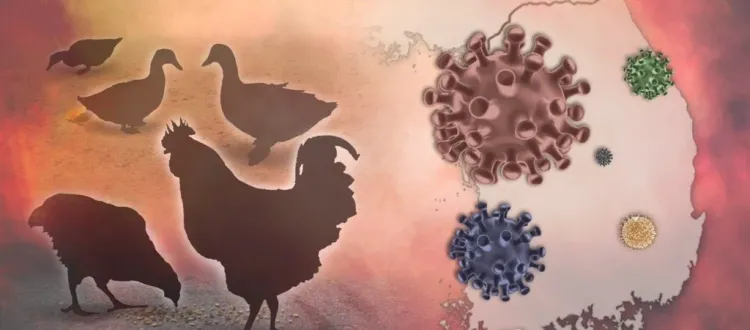What Are the Latest Bird Flu Outbreaks in South Africa's Western Cape?

Synopsis
Key Takeaways
- Confirmed bird flu outbreaks in South Africa's Western Cape.
- Public urged to remain vigilant but not alarmed.
- Poultry products from stores are safe for consumption.
- Farmers to implement strict biosecurity measures.
- Report any unusual bird deaths to local authorities.
Cape Town, Aug 2 (NationPress) The authorities in South Africa's Western Cape have announced confirmed cases of bird flu outbreaks in the region, advising the public to remain vigilant but not alarmed.
The Western Cape Department of Agriculture has issued a warning to both poultry farmers and the general populace regarding the emergence of high pathogenicity avian influenza, commonly known as bird flu. This announcement was made in a statement released on Friday evening.
Recent cases have been identified in chickens from the North West and Mpumalanga provinces, along with a singular case in the Western Cape, which was detected in farmed ducks near Paarl in early July. The statement noted that the affected ducks, along with connected flocks of chickens, were voluntarily and humanely culled to prevent further disease transmission, according to Xinhua news agency.
Additionally, bird flu has led to the deaths of great white pelicans in the vicinity of Cape Town. The statement indicated, “These are the first wild bird cases reported in the Western Cape since April 2024 and the first mass mortalities since 2022.”
While the situation raises concerns, “consumers can be assured that poultry products from grocery stores are safe for consumption,” the statement added.
Avian influenza is a viral disease that predominantly impacts birds. Although the virus has occasionally infected mammals and humans internationally, the department stressed that there is currently no evidence of human-to-human transmission, maintaining that the risk to humans remains low.
Nonetheless, officials have advised the public to avoid handling sick or deceased wild birds without proper protective equipment and to report any unusual bird deaths to local authorities.
The Western Cape government encourages both the public and the agricultural sector to take part in efforts to prevent the spread of this disease in poultry. “It is crucial to report suspected outbreaks in poultry to the local State Veterinarian immediately,” the statement emphasized.
The department also urged farmers and poultry producers to implement stringent biosecurity measures to mitigate the risk of infection from both wild and domestic birds.
“By working together through vigilance and cooperation, we can help prevent the further spread of avian influenza and protect our birds, our poultry industry, and our communities,” it concluded.










